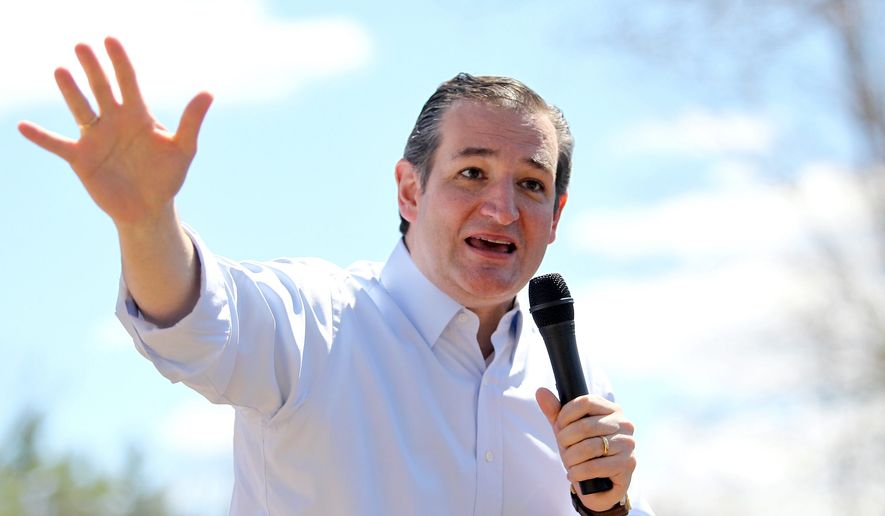Sen. Ted Cruz is asking lawmakers to consider allowing troops to carry personal firearms on base for protection, reviving a fight that has previously been a nonstarter with Congress after military leaders said they didn’t support the change.
While many lawmakers said Tuesday they were open to having a discussion on changing the rules in a Senate Committee on Armed Services hearing, most said that they would defer issues of base security to military leaders — who have historically been against allowing concealed carry on their posts.
Mr. Cruz formally sent a letter to Sen. John McCain, Arizona Republican and chairman of the committee, on Tuesday afternoon asking for a hearing on the subject, saying that current restrictions impede Second Amendment rights and weaken the safety and security of troops.
“The men and women in our military have been at war for over a decade; they understand the responsibilities that go along with carrying a firearm,” Mr. Cruz wrote in the letter. “Yet their Second Amendment rights are removed at the front gate.”
Mr. McCain said he has referred the issue to the personnel subcommittee “to let them take action if they want to.”
“I think we ought to have the hearing, but we need the input of the military. They’re the ones who are directly affected by this, and I’m not making up my mind until I hear from the United States military,” Mr. McCain told reporters Tuesday.
Sen. Lindsey Graham, the South Carolina Republican who chairs the personnel subcommittee, said he would try to get a hearing scheduled to let the military speak on how a rule change would affect their security.
Advocates of letting troops carry a weapon have said it could have prevented incidents like the 2009 shooting at Fort Hood, Texas, or the 2013 shooting at the Navy Yard in Washington if troops were armed and able to stop a gunman.
The Pentagon reiterated last April that it didn’t support allowing troops to carry concealed weapons on military installations after a second shooting at Fort Hood, in which a gunman killed three people. Pentagon spokesman Col. Steve Warren said that the cost of training and certification requirements would be prohibitive.
“There are a lot of barriers to this idea, and the department’s position — and we’ve spelled this out before — is that we do not support it,” Col. Warren said last April.
A Defense Department spokesman said he didn’t believe the department’s position had changed since last year.
Sen. Thom Tillis, North Carolina Republican, said he too would defer to military leaders’ viewpoints before making a decision on whether to support allowing service members to carry concealed guns on bases.
“I’m always open to good ideas on being able to expand concealed carry privileges,” Mr. Tillis said. “The key though is to make sure the folks on the ground who are responsible ultimately for the safety of soldiers and their families, that they’re comfortable with it.”
Mr. Tillis also noted that the Senate Armed Services Committee is beginning the lengthy process of considering and passing an annual defense policy bill in just a few weeks, meaning hearings on any other subject could get pushed down the road.
“It’s also a matter of just time capacity and priority,” he said.
Before 1993 each base commander determined what the carry rules would be at his base. But federal regulations put into effect that year block personnel who are not on security duty from carrying firearms. In the years following, even more regulations have been put in place. Following the shooting at Fort Hood, that installation now requires soldiers to register their weapons with commanders.
Commanders against concealed carry fear accidental discharges and fights between soldiers may escalate into serious violence.
However, lawmakers raised the issue of troops carrying personal weapons on base as an amendment to last year’s annual defense policy bill, but it failed to gain support in the GOP-controlled House.
Josh Horwitz, executive director of the Coalition to Stop Gun Violence, said the lack of support for previous proposals to loosen concealed carry rules on military installations shows that Mr. Cruz’s latest revival of the issue is just a “political stunt.”
“It’s unfortunate he wants to interfere with the readiness of the armed forces,” he said. “This should be dealt with by the military personnel who deal with these issues on a daily basis.”
• Jacqueline Klimas can be reached at jklimas@washingtontimes.com.




Please read our comment policy before commenting.